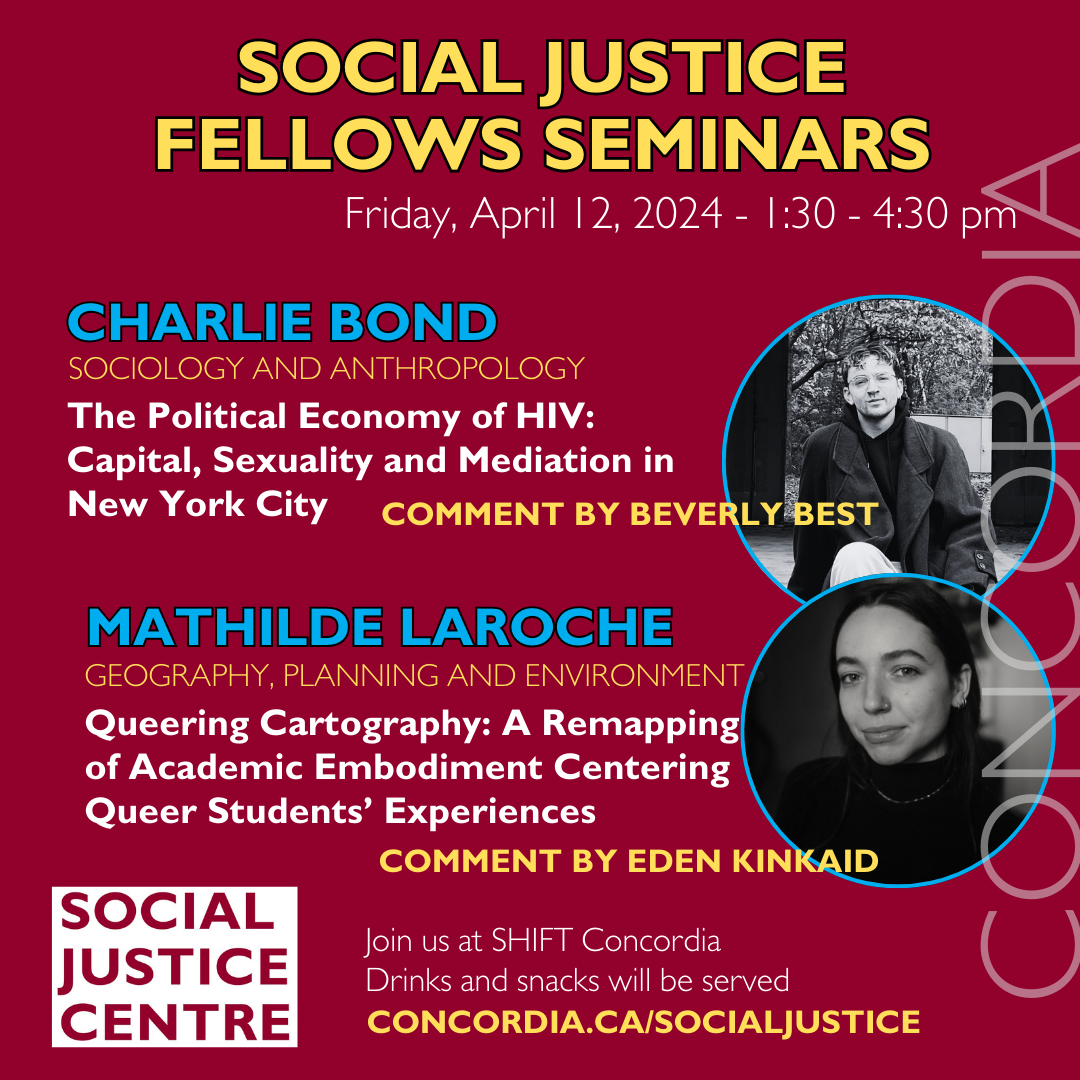Date & time
1:30 p.m. – 4:30 p.m.
Charlie Bond and Mathilde LaRoche
This event is free.
J.W. McConnell Building
1400 De Maisonneuve Blvd. W.
SHIFT Centre for Social Transformation
Room Conference room
Yes - See details
Join us for the second session of our Social Justice Graduate Fellows Seminars.
We will hear about the work of two graduate fellows: Charlie Bond and Mathilde LaRoche
Charlie Bond (PhD student in the Sociology and Anthropology Department) will present: "The Political Economy of HIV: Capital, Sexuality and Mediation in New York City" followed by a comment by Beverly Best.
Mathilde LaRoche (Master student, Department of Geography, Planning & Environment) will present "Queering Cartography: A Remapping of Academic Embodiment Centering Queer Students’ Experiences" followed by a comment by Eden Kinkaid.
Everyone is welcome - Snacks and drinks will be served.
In person: Join us in the conference room at SHIFT Centre for Social Transformation. Register on eventbrite or on the facebook event (not mandatory)
Join us remotely: Register on zoom to get the link
Title: "The Political Economy of HIV: Capital, Sexuality and Mediation in New York City"
This talk will be followed by a short commentary by Beverly Best, Associate Professor, Sociology and Anthropology. Dr. Best researches the modalities of contemporary capitalist society and how these modalities are expressed in conventions of perception and representation, dynamics of collective subjectivity, aesthetic ideologies, and cultural forms and practices. Her recent work focuses on the deep value dynamics of financialization, as well as the social and ideological formations of that historical process. Dr. Best has also pursued studies of analytical methods such as critical theory, critique of political economy, and dialectics. She is the author of Marx and Dynamic of the Capital Formation: An Aesthetics of Political Economy, and co-editor (with Werner Bonefeld and Chris O’Kane) of The Sage Handbook of Frankfurt School Critical Theory. She is the vice-president of the Marxist Literary Group.
Title: Queering Cartography: A Remapping of Academic Embodiment Centering Queer Students’ Experiences
Abstract: In a contemporary academic landscape increasingly influenced by neoliberalism, the study highlights the enduring significance of university spaces for student queer communities as sites for both the reproduction of heterocisnormativity and queer community building. Within this context, the present research centers the embodied experiences of queer students to explore the presence and impact of power dynamics inscribed in academic spaces. Queer (Bell & Valentine, 1995; Johnston & Longhurst, 2010) and trans geographies (Nash, 2010) are at the forefront of this research due to their exploration of the tension between the body as a site of multi-scalar power dynamics and the intimacy of embodied queer emotions (Knopp, 2007). Ahmed's queer phenomenology (2006) is indispensable for its interpretation of orientation, disorientation, desire and embodiment as vectors of movement, action and experience in/of space. Focusing on two Montreal universities, the research seeks to answer a fundamental question: what does the embodied experience of queer students tell us about university spaces? This study uses sensitive mapping (Olmedo, 2015) to center the embodied experiences of queer university students. Interpreted through the lens of queer phenomenology, the maps and qualitative interviews serve as creative research methods that contribute to the reconsideration of geography's theoretical and practical horizons. Key findings include unique campus trajectories shaped by the students’ identities, spatially perceivable tensions between the student body and the Administration, shared experiences of comfort and discomfort within specific contexts, and the utmost importance of student-led community spaces within universities.
Offering a brief overview of Mathilde’s master’s thesis in its entirety, the session’s primary focus is the methodological contributions of this research, with a particular emphasis on the idea of sensitive mapping as a tool for a co-creation of research results and a queering of cartography.
Mathilde's talk will be followed by a commentary by Dr. Eden Kinkaid (they/them) a feminist, queer, and trans human geographer. Their work focuses on queer embodiment, trans-feminisms, critical phenomenology, and theories of space. They also research and write on the topic of agriculture and food systems, urban development, creative geographies, and diversity, equity, and inclusion in geography. They currently coordinate the Queering Feminist Geography Collective and are working on their first book, Critical Phenomenology Now! Eden has served in editorial roles at Gender, Place, and Culture, The Graduate Journal of Food Studies, and you are here: the journal of creative geography. You can follow them on Twitter, Instagram, and Bluesky @queergeog.

Charlie Bond is a PhD student in the Sociology and Anthropology Department at Concordia University. He earned his BA in philosophy at University College London, and MA in contemporary literature, culture, and theory at King’s College London.
Drawing on Marxian political economy, urban geography, and queer history, Charlie’s research examines the fraught relationship between capital accumulation and the production of sexuality. His thesis follows this relationship to 1980s New York City, tracing how the City’s fiscal and HIV crises structurally reproduced one another. Charlie’s research questions include: What is the relationship between New York City’s economic restructuring and HIV transmission, treatment, mortality? How did the City’s historically affordable, queer neighbourhoods become some of the most expensive places to live in the world? And how did queer resistance mobilise in and against this political economy HIV?
Mathilde LaRoche holds a Bachelor's degree in Geography from the Université du Québec à Montréal (2020) and is a candidate for the Master's degree in Geography, Urban and Environmental Studies from the Department of Geography, Planning & Environment at Concordia University.
Their Master's thesis adopts the perspectives of queer studies, critical geographies and queer phenomenology to explore the embodied experiences of queer students within university spaces in Tiohtià:ke, Montreal. Sensitive mapping is at the heart of Mathilde’s methodological practices, notably mobilized with the aim of queering the field of conventional cartography. With a particular focus on the power structures that shape our universities, her work is driven by a desire to reconsider and even reappropriate academic spaces and the research practices they entail.
© Concordia University